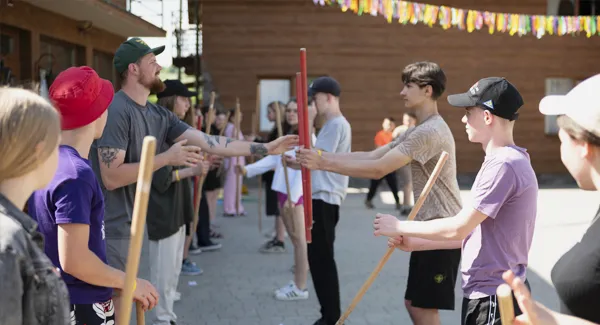Healing through nature in Ukraine: Vitalii's mission at Camp Lighthouse

At Camp Lighthouse, Vitalii leads leisure and sports activities for children. A psychologist by training, Vitalii says a camp experience he had as a teenager convinced him of the importance of safe, supportive spaces and the benefits of being in nature for children from conflict-affected areas.
A child of war himself
“When the war in Ukraine started in 2014, the place where I lived with my family was very close to the frontline. I was 15. After a while, I had the opportunity to attend a vacation camp for children from the conflict-affected areas of Donetsk and Luhansk Regions.”
The experience had a profound impact on Vitalii. Once camp was over, he went back home to tell his parents he was moving. “I applied to a high school in Kyiv and began organizing my move. My parents weren’t happy, but they realized that in Kyiv there were options that could support my ambitions.”
Returning to camp as a counsellor
Vitalii finished high school, earned an undergraduate degree in psychology, and plans on pursuing a master’s in the same field.
During his studies, Vitalii returned to the same camp environment, this time as a camp counsellor. The pandemic put a stop to the camps for two years, during which time he supported himself by working in video production and counselling young people with addictions.
A few months after the full-scale war started in 2022, Vitalii joined the team at Camp Lighthouse, the children’s vacation camp run by SOS Children’s Villages Ukraine, as a camp counsellor. His experience, enthusiasm and dedication contributed to the camp’s popularity among children and families.
Leading activities, creating happy memories
At Camp Lighthouse, Vitalii is constantly present, connecting with every child to ensure their safety and that they are having fun. He is deeply involved in the daily program, organizing outdoor activities such as body movement workshops, hiking, and nature exploration. He also introduces new experiences, including building a dinghy from wooden pallets and leading overnight camping trips. For many of the teenagers, it is their first time sleeping in tents and stargazing by a campfire.
Stability through shared experience
Vitalii’s work goes beyond fun and games; it’s deeply emotional. Acknowledging this, he says, “Life became very complicated for the children of Ukraine. Many have painful experiences. The stories of all the children here are close to me because they are my stories too. I can relate. I too, heard shelling as a child. I know what a night in a bomb shelter looks and feels like.
He also knows how vital emotional support is. As an adult, he draws strength from his peers, teammates, friends and family. But for children, he says, the most important support comes from a stable adult, ideally a parent, but also other caring adults who can provide safety and reassurance during uncertain times.
Nature as a place for healing
When it comes to personal healing, Vitalii explains that he finds his in nature: “When I feel bad, disappointed or in despair, I go to the mountains or the forest. There, among the trees, I feel safe and well.”
As his safe place perfectly fits his job description, Vitalii encourages the children to spend as much time as possible in nature. He estimates that around 70% of the children have never left their home regions, and some have never even seen mountains. He has the unique opportunity to witness their smiles, being carefree and experiencing new adventures, and the healing they derive from it.
A moment under the stars
One particular experience that left a deep impression on him was during a dinghy trip across the lake. After a rare moment of silence around the campfire, a teen boy from Kherson Region said, “I can’t believe I’m looking at the stars. I can’t believe that I sit around the campfire and that there’s no shelling and no need to hide the light. I can’t believe it. I feel so different. I don’t understand what is happening inside of me.”
With typical Ukrainian resilience, Vitalii shakes his head when asked if hearing hard stories brings back childhood traumas. “No, I don’t have flashbacks. I survived. I coped. I overcame.
“I am still human, though. Sometimes when I hear painful stories, I want to cry. It’s hard for me to grasp that in today’s world, we have developed AI, yet we haven’t stopped killing each other. Why do people continue to wage war?”
